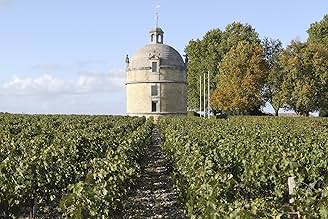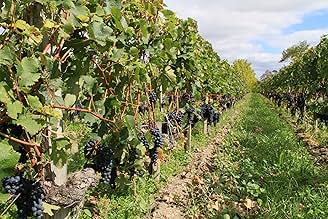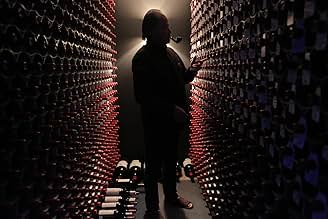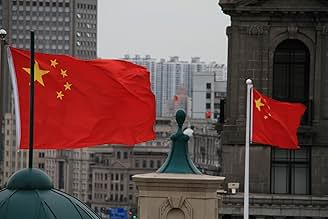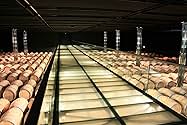NOTE IMDb
6,6/10
1,4 k
MA NOTE
Ajouter une intrigue dans votre langueThe great chateaux of Bordeaux struggle to accommodate the voracious appetite for their rare, expensive wines, which have become a powerful status symbol in booming China.The great chateaux of Bordeaux struggle to accommodate the voracious appetite for their rare, expensive wines, which have become a powerful status symbol in booming China.The great chateaux of Bordeaux struggle to accommodate the voracious appetite for their rare, expensive wines, which have become a powerful status symbol in booming China.
- Réalisation
- Scénario
- Casting principal
- Récompenses
- 2 victoires et 4 nominations au total
Avis à la une
I'm a wine person.
I have consumed, studied, taught and debated the topic for almost 30 years now. I love the stuff. But... watching this film reminded me how wound up we wine-people are in our own world.
Although I found the documentary interesting and important to know, I also recognise that this film grossed less than US$10,000- at the box office. Now, I don't know what the budget was to make this film, but who in their right mind thought that this would be a good idea for a theatrical release? I'm guessing that enough people got together and convinced themselves that this would work. And secured enough funding from (almost surely) a wealthy wine-lover.
No rational film producer would ever have looked at the script and gone 'Yeah, images of French châteaux, and celebrities in the wine field will be a huge hit! Let's get Rusty to narrate and we've got it made!!!'
If you're just starting to develop an interest in wine, this should be mandatory watching. Enthusiasts already know most of the content, and will probably bemoan the lack of further detail. But if wine isn't your thing, you'll really wish you'd spent the 75 minutes on another film.
I have consumed, studied, taught and debated the topic for almost 30 years now. I love the stuff. But... watching this film reminded me how wound up we wine-people are in our own world.
Although I found the documentary interesting and important to know, I also recognise that this film grossed less than US$10,000- at the box office. Now, I don't know what the budget was to make this film, but who in their right mind thought that this would be a good idea for a theatrical release? I'm guessing that enough people got together and convinced themselves that this would work. And secured enough funding from (almost surely) a wealthy wine-lover.
No rational film producer would ever have looked at the script and gone 'Yeah, images of French châteaux, and celebrities in the wine field will be a huge hit! Let's get Rusty to narrate and we've got it made!!!'
If you're just starting to develop an interest in wine, this should be mandatory watching. Enthusiasts already know most of the content, and will probably bemoan the lack of further detail. But if wine isn't your thing, you'll really wish you'd spent the 75 minutes on another film.
This is a documentary for wine lovers. Beer drinkers need not apply.
The film is tastefully done, great photography, beautiful soundtrack. Needs to be watched with a glass of red wine in hand, as it really whets your appetite.
Should it go deeper into the subject? Should it explain that the great French Wine Blight did NOT make the 1855 classification obsolete, because the vines were grafted to Chilean roots (resistant to the phylloxera) imported hastily in thousands, to save them (not only in France, but in other parts of Europe too)?
Maybe. That would have made for a slightly longer film, perhaps more thrilling (Will the vines be completely lost? Who could save them? Wait! Up in the sky: it's a bird... it's a plane... No, it's super-vine! Actually, it was "la super viña", from Chile).
But it would have been a different film, missing the elegant balance of this one.
Perhaps this film's success will spur a sequel: "Red Obsession 2 - Attack of the insects from Hell". It will need a different soundtrack (by Hans Zimmer?) and a different narrator; Russell Crowe is too mellow for that!
The film is tastefully done, great photography, beautiful soundtrack. Needs to be watched with a glass of red wine in hand, as it really whets your appetite.
Should it go deeper into the subject? Should it explain that the great French Wine Blight did NOT make the 1855 classification obsolete, because the vines were grafted to Chilean roots (resistant to the phylloxera) imported hastily in thousands, to save them (not only in France, but in other parts of Europe too)?
Maybe. That would have made for a slightly longer film, perhaps more thrilling (Will the vines be completely lost? Who could save them? Wait! Up in the sky: it's a bird... it's a plane... No, it's super-vine! Actually, it was "la super viña", from Chile).
But it would have been a different film, missing the elegant balance of this one.
Perhaps this film's success will spur a sequel: "Red Obsession 2 - Attack of the insects from Hell". It will need a different soundtrack (by Hans Zimmer?) and a different narrator; Russell Crowe is too mellow for that!
"Red Obsession" makes the viewer appreciate the true artistry involved in wine making, and the asomatous beauty involved in wine tasting (ordering wine at the Olive Garden is not wine tasting.) Drinking a good wine can be an orgasmic physical experience, as well as a genuinely spiritual one. Some of the interviewed eloquently describe an exquisite wine as an enduring experience.
The scenic views of French countryside and century-old vineyards are astounding. "Red Obsession" has some of the most spectacular cinematography this reviewer has ever seen. This alone is a very good reason to watch.
The film eventually moves into the current politics of the luxury wine industry. The epicentre of this business is currently China, which is now the largest importer of Bordeaux wines in the world. The rest of the film can be summarized in a sentence spoken by one of the commentators: "When the Chinese buy the wine, they buy the wine as a symbol of their status." The film's content, which includes exploration of the shifting market, and the changing production and consumption of premier château wines, was very informative and interesting to this uncultivated viewer. But the film is as untroubled as the well-off Chinese in it, who think nothing of dropping tens of millions of dollars buying wines, creating connoisseur clubs, or purchasing antiquated French chateaus.
Overflowing with conceit and extravagance, "Red Obsession" turns out mostly shallow and pretentious. The film doesn't ask any questions, or challenge conventional thinking, or break any new ground. Yes it is a documentary, but it is not constructive filmmaking.
screenplayisles.blogspot
The scenic views of French countryside and century-old vineyards are astounding. "Red Obsession" has some of the most spectacular cinematography this reviewer has ever seen. This alone is a very good reason to watch.
The film eventually moves into the current politics of the luxury wine industry. The epicentre of this business is currently China, which is now the largest importer of Bordeaux wines in the world. The rest of the film can be summarized in a sentence spoken by one of the commentators: "When the Chinese buy the wine, they buy the wine as a symbol of their status." The film's content, which includes exploration of the shifting market, and the changing production and consumption of premier château wines, was very informative and interesting to this uncultivated viewer. But the film is as untroubled as the well-off Chinese in it, who think nothing of dropping tens of millions of dollars buying wines, creating connoisseur clubs, or purchasing antiquated French chateaus.
Overflowing with conceit and extravagance, "Red Obsession" turns out mostly shallow and pretentious. The film doesn't ask any questions, or challenge conventional thinking, or break any new ground. Yes it is a documentary, but it is not constructive filmmaking.
screenplayisles.blogspot
It's technically not bad... I just get frustrated when documentaries seem to stumble into really fascinating territory and then quickly back out to go back to what they (likely) planned.
Exploring what drives people to bid money on things like super expensive wine (some of whom admit they don't even drink it!) is potentially really fascinating. Is it appealing like gambling? Is it selfish? It is an empty display of wealth that, upon reflection, such auction participants would feel guilt about?
And the notion of fraudulent luxury goods? Genuinely fascinating! Questions about whether not knowing the difference means the real things are meaningless, whether you can be happy with fakes, whether it turns people off even trying to get the genuine things...
But nah. The documentary is solid but entirely too straightforward to be more than sporadically (maybe even unintentionally) interesting in an intense way for more than a few moments here or there.
Oh well.
Exploring what drives people to bid money on things like super expensive wine (some of whom admit they don't even drink it!) is potentially really fascinating. Is it appealing like gambling? Is it selfish? It is an empty display of wealth that, upon reflection, such auction participants would feel guilt about?
And the notion of fraudulent luxury goods? Genuinely fascinating! Questions about whether not knowing the difference means the real things are meaningless, whether you can be happy with fakes, whether it turns people off even trying to get the genuine things...
But nah. The documentary is solid but entirely too straightforward to be more than sporadically (maybe even unintentionally) interesting in an intense way for more than a few moments here or there.
Oh well.
It was once said that when you were considered successful in China, you drove a German car, wore a Swiss watch and drank French wine. This documentary was release 13 years ago as I write this. It's now 2025. For China's then nouveau riche - who very likely remembered suffering through the brutal and austere decades of the Chinese Communist Party's 30-ish years of great leaps backward - the sudden and comparative (though far from total) freedom starting in the 1980's to get 'gloriously' rich resulted in the belief that there were no higher status symbols, no greater signifiers to the teeming masses of 'great unwashed' from which you sprang but far exceeded, than the luxury European products many Chinese could only dream about for decades, if they were even allowed to know they existed at all.
Their love of wine, long term, was to be the undoing of a great many of them and to that I can only say "Good!". That has nothing to do with the mainland Chinese as a people, and much more to do with Mainland China as an unstable political construct that often backtracks on what few real freedoms it gives its people. This has become all the more apparent in the decade leading up to this year, 2025.
The arrogance of then-contemporary (2011-ish) mainland Chinese elites participating in this documentary is both honest and off the charts, but this was probably much less apparent at the time of the film's release because China was indeed on an upward trajectory. Until it wasn't.
Now, in 2025, many of the film's subjects have been reminded of the major difference between China (and now once-free Hong Kong, sadly) and longstanding western democratic cultures: when the Chinese Communist Party decides the good times are over, they're over for everyone. Period. Full stop.
When the lust in China for French wine was at its peak, Chinese entrepreneurs bought over 200 French chateaus because their undisguised greed convinced them that the best way to supply what they wrongly predicted would be the exploding China market for authentic French wine was to buy the wineries themselves and ship the bulk of the product to China from there. One such sucker, Richard Shen, claims in the film that the wines from his Bordeaux estate were only getting better because "all the best people work for me." Another Chinese interview subject says that in a few decades (after 2012), the entire world's production will not meet the demands of China. Narrator Russell Crowe - presumably hired because of his role in Ridley Scott's 2006 French vineyard-set drama A GOOD YEAR - even says at one point that in the next four decades, "China is set to become the world's largest producer of wine." On that note, another entrepreneur, who's never been to France, claims that the soil in the China's barren, isolated northwestern region of Ningxia can cultivate grapes equal to Bordeaux because then soil is apparently similar. He believes if the French can succeed over centuries, the Chinese can parrot that success in a few years through sheer willpower. Moments later we see stewards at another winery in the region explaining how much harsher the environment is there, and how difficultly the vines must be handled. One brief upside: a Chinese wine is shown winning the prestigious 2011 Decanter Award for the first time.
To say that virtually nothing predicted in this film came to pass is an understatement, but one cannot blame the filmmakers. RED OBSESSION actually does end on a down note, circa 2012, when the bloom was just beginning to come off the rose after a decade-long boom in steamroller Chinese affluence (and the accompanying attitude) that many assumed culminate with China taking over the world.
Alas, it was all downhill to this day. The wine situation is just the tip of the iceberg.
---------
From a 2025 article on Luxuo:
---------
"As China loses its love for imported wine, hundreds of Chinese-owned vineyards are sold at knockdown prices. For many investors based in Beijing and Shanghai, the prospect of making a significant profit has turned sour. Several causes are driving the sell-off. Tighter capital controls make it harder for the Chinese to spend money overseas, and a domestic crackdown on corruption has reduced demand for pricey presents.
Nine châteaux near Bordeaux - valued at around EUR 35.5 million - were seized by France in May from a Chinese entrepreneur who had been found guilty of misappropriating Chinese state funds and money laundering."
---------
And here's a snippet of a 2025 article on The Drinks Business website:
---------
"Michael Baynes of Vineyards Bordeaux, who sold 12 wineries last year, said cultural misunderstandings contributed to many of the struggles. In China, he said, seeking advice is often seen as a sign of weakness, leading some buyers to make poorly informed decisions.
With the market now saturated, vineyard prices have plummeted. Vineyards Bordeaux reports that average prices per hectare have fallen from around 55,000 euros in 2000 to as little as 10,000 euros today.
Additional pressures, including Chinese currency controls limiting overseas transfers and French banks tightening loans to small vineyards, have led to what Baynes described as a "fire sale". He said that by the end of 2024, around 400 Bordeaux vineyards were on the market - double the usual number - with about 70% classified as distressed sales needing urgent maintenance."
---------
And from the Swiss finance site Finews, also in 2025, which piggybacks on reporting from Luxuo quoted above:
---------
"The acquisition spree began in the late 2000s, as affluent Chinese buyers sought to capitalize on the booming demand for Bordeaux wine in their home market. Over 200 vineyards were purchased, often rebranded with auspicious names like «Gold Rabbit.» Investors, driven by China's growing appetite for red wine, hoped to secure both financial returns and social prestige.
However, this enthusiasm has faded dramatically. The austerity measures introduced by Chinese President Xi Jinpingin 2013 curbed extravagant spending, and subsequent capital controls further restricted outbound investments. By 2017, Beijing's tighter regulations had crippled many Chinese-owned vineyards' operations.
Meanwhile, China's wine consumption has steadily declined, dropping by 25 percent in 2023 alone, according to the International Organization of Vine and Wine.
Many of these estates are now returning to the market. Château Latour-Laguens, one of the first Bordeaux properties bought by Chinese investors in 2008, exemplifies the downturn. Initially purchased for 2 million euros, the estate is now listed for just 150,000 euros, its vines abandoned and buildings in disrepair, as «LUXUO» notes.
French Investors Reclaiming Territory Other properties face similar challenges. Labor disputes, cultural clashes, and absentee ownership have plagued operations, leading to unpaid wages and management controversies. A local union representative noted that Chinese proprietors often lacked the trust needed to work effectively with French employees, compounding operational difficulties."
---------
Back to me . . .
So here we are, in 2025, and we can see that the boom has been going bust in China for years now. And honestly, it's probably for the best because of the effects of the disastrous culture clash illustrated in the quoted material above. The cultures are simply too far apart. As one French expert notes in the film, for the French winemakers the goal is PLEASING those who would drink their wares, regardless of the price (even though that's obviously a nice bonus). For the mainland Chinese, the explosion in interest in wine was only ever about status - just like those Ferraris and Swiss watches - and IMPRESSING those around you with your 'western' tastes and pretensions. The CCP put paid to that kind of ambition, affluence, and influence in relatively short order, as it was bound to do. That's the harsh reality learned by the vast majority of 'wine entrepreneurs' for whom status was everything, and whose high-minded adventures depicted in this documentary turned into folly in the years since its release.
Their love of wine, long term, was to be the undoing of a great many of them and to that I can only say "Good!". That has nothing to do with the mainland Chinese as a people, and much more to do with Mainland China as an unstable political construct that often backtracks on what few real freedoms it gives its people. This has become all the more apparent in the decade leading up to this year, 2025.
The arrogance of then-contemporary (2011-ish) mainland Chinese elites participating in this documentary is both honest and off the charts, but this was probably much less apparent at the time of the film's release because China was indeed on an upward trajectory. Until it wasn't.
Now, in 2025, many of the film's subjects have been reminded of the major difference between China (and now once-free Hong Kong, sadly) and longstanding western democratic cultures: when the Chinese Communist Party decides the good times are over, they're over for everyone. Period. Full stop.
When the lust in China for French wine was at its peak, Chinese entrepreneurs bought over 200 French chateaus because their undisguised greed convinced them that the best way to supply what they wrongly predicted would be the exploding China market for authentic French wine was to buy the wineries themselves and ship the bulk of the product to China from there. One such sucker, Richard Shen, claims in the film that the wines from his Bordeaux estate were only getting better because "all the best people work for me." Another Chinese interview subject says that in a few decades (after 2012), the entire world's production will not meet the demands of China. Narrator Russell Crowe - presumably hired because of his role in Ridley Scott's 2006 French vineyard-set drama A GOOD YEAR - even says at one point that in the next four decades, "China is set to become the world's largest producer of wine." On that note, another entrepreneur, who's never been to France, claims that the soil in the China's barren, isolated northwestern region of Ningxia can cultivate grapes equal to Bordeaux because then soil is apparently similar. He believes if the French can succeed over centuries, the Chinese can parrot that success in a few years through sheer willpower. Moments later we see stewards at another winery in the region explaining how much harsher the environment is there, and how difficultly the vines must be handled. One brief upside: a Chinese wine is shown winning the prestigious 2011 Decanter Award for the first time.
To say that virtually nothing predicted in this film came to pass is an understatement, but one cannot blame the filmmakers. RED OBSESSION actually does end on a down note, circa 2012, when the bloom was just beginning to come off the rose after a decade-long boom in steamroller Chinese affluence (and the accompanying attitude) that many assumed culminate with China taking over the world.
Alas, it was all downhill to this day. The wine situation is just the tip of the iceberg.
---------
From a 2025 article on Luxuo:
---------
"As China loses its love for imported wine, hundreds of Chinese-owned vineyards are sold at knockdown prices. For many investors based in Beijing and Shanghai, the prospect of making a significant profit has turned sour. Several causes are driving the sell-off. Tighter capital controls make it harder for the Chinese to spend money overseas, and a domestic crackdown on corruption has reduced demand for pricey presents.
Nine châteaux near Bordeaux - valued at around EUR 35.5 million - were seized by France in May from a Chinese entrepreneur who had been found guilty of misappropriating Chinese state funds and money laundering."
---------
And here's a snippet of a 2025 article on The Drinks Business website:
---------
"Michael Baynes of Vineyards Bordeaux, who sold 12 wineries last year, said cultural misunderstandings contributed to many of the struggles. In China, he said, seeking advice is often seen as a sign of weakness, leading some buyers to make poorly informed decisions.
With the market now saturated, vineyard prices have plummeted. Vineyards Bordeaux reports that average prices per hectare have fallen from around 55,000 euros in 2000 to as little as 10,000 euros today.
Additional pressures, including Chinese currency controls limiting overseas transfers and French banks tightening loans to small vineyards, have led to what Baynes described as a "fire sale". He said that by the end of 2024, around 400 Bordeaux vineyards were on the market - double the usual number - with about 70% classified as distressed sales needing urgent maintenance."
---------
And from the Swiss finance site Finews, also in 2025, which piggybacks on reporting from Luxuo quoted above:
---------
"The acquisition spree began in the late 2000s, as affluent Chinese buyers sought to capitalize on the booming demand for Bordeaux wine in their home market. Over 200 vineyards were purchased, often rebranded with auspicious names like «Gold Rabbit.» Investors, driven by China's growing appetite for red wine, hoped to secure both financial returns and social prestige.
However, this enthusiasm has faded dramatically. The austerity measures introduced by Chinese President Xi Jinpingin 2013 curbed extravagant spending, and subsequent capital controls further restricted outbound investments. By 2017, Beijing's tighter regulations had crippled many Chinese-owned vineyards' operations.
Meanwhile, China's wine consumption has steadily declined, dropping by 25 percent in 2023 alone, according to the International Organization of Vine and Wine.
Many of these estates are now returning to the market. Château Latour-Laguens, one of the first Bordeaux properties bought by Chinese investors in 2008, exemplifies the downturn. Initially purchased for 2 million euros, the estate is now listed for just 150,000 euros, its vines abandoned and buildings in disrepair, as «LUXUO» notes.
French Investors Reclaiming Territory Other properties face similar challenges. Labor disputes, cultural clashes, and absentee ownership have plagued operations, leading to unpaid wages and management controversies. A local union representative noted that Chinese proprietors often lacked the trust needed to work effectively with French employees, compounding operational difficulties."
---------
Back to me . . .
So here we are, in 2025, and we can see that the boom has been going bust in China for years now. And honestly, it's probably for the best because of the effects of the disastrous culture clash illustrated in the quoted material above. The cultures are simply too far apart. As one French expert notes in the film, for the French winemakers the goal is PLEASING those who would drink their wares, regardless of the price (even though that's obviously a nice bonus). For the mainland Chinese, the explosion in interest in wine was only ever about status - just like those Ferraris and Swiss watches - and IMPRESSING those around you with your 'western' tastes and pretensions. The CCP put paid to that kind of ambition, affluence, and influence in relatively short order, as it was bound to do. That's the harsh reality learned by the vast majority of 'wine entrepreneurs' for whom status was everything, and whose high-minded adventures depicted in this documentary turned into folly in the years since its release.
Le saviez-vous
- ConnexionsFeatured in At the Movies: Épisode #10.26 (2013)
Meilleurs choix
Connectez-vous pour évaluer et suivre la liste de favoris afin de recevoir des recommandations personnalisées
Détails
Box-office
- Montant brut aux États-Unis et au Canada
- 13 199 $US
- Week-end de sortie aux États-Unis et au Canada
- 5 060 $US
- 8 sept. 2013
- Montant brut mondial
- 238 223 $US
- Durée1 heure 15 minutes
- Couleur
- Mixage
- Rapport de forme
- 1.85 : 1
Contribuer à cette page
Suggérer une modification ou ajouter du contenu manquant

Lacune principale
By what name was Red Obsession (2013) officially released in India in English?
Répondre



